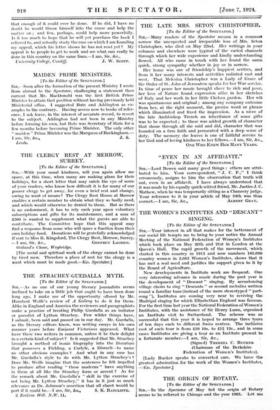THE STRACHEY-GUEDALLA MYTH.
[To the Editor of the SPECTATOR.] SIR,—As no one of our young literary journalists seems inclined to take on a little job that ought to have been done long ago, I make use of the opportunity offered by Mr. Humbert Wolfe's review of A Gallery to do it for them. Alike in England and America the reviewers and paragraphists make a practice of treating Philip • Guedalla as an imitator or parodist of Lytton Strachey. Few wilder things have, I submit, been said and passed on in our day. Mr. Guedalla, as the literary editors know, was writing essays in his own manner years before Eminent Victorians appeared. What have these two writers in common, unless it be their delight in a certain kind of subject? Is it suggested that Mr. Strachey brought a method of ironic biography into the literature that possesses a Fielding, a Carlyle, a Disraeli—to name no other obvious examples ? And what in any case has Mr. Guedalla's style to do with Mr. Lytton Strachey's ? Does Mr. Wolfe imagine that the sentences he felt impelled to produce after reading " these moderns " have anything in them at all like the Strachey form or accent ? As for the remark about Mr. Guedalla's " skill in the exercise of not being Mr. Lytton Strachey," it has in it just as much relevance as Dr. Johnson's assertion that all claret would be










































 Previous page
Previous page